‘Everything fell apart’ Amid grief and trauma, families struggle to make sense of deaths at the hands of police, with little legal support through the inquest process
Read this article for free:
or
Already have an account? Log in here »
To continue reading, please subscribe:
Monthly Digital Subscription
$1 per week for 24 weeks*
- Enjoy unlimited reading on winnipegfreepress.com
- Read the E-Edition, our digital replica newspaper
- Access News Break, our award-winning app
- Play interactive puzzles
*Billed as $4.00 plus GST every four weeks. After 24 weeks, price increases to the regular rate of $19.95 plus GST every four weeks. Offer available to new and qualified returning subscribers only. Cancel any time.
Monthly Digital Subscription
$4.99/week*
- Enjoy unlimited reading on winnipegfreepress.com
- Read the E-Edition, our digital replica newspaper
- Access News Break, our award-winning app
- Play interactive puzzles
*Billed as $19.95 plus GST every four weeks. Cancel any time.
To continue reading, please subscribe:
Add Free Press access to your Brandon Sun subscription for only an additional
$1 for the first 4 weeks*
*Your next subscription payment will increase by $1.00 and you will be charged $16.99 plus GST for four weeks. After four weeks, your payment will increase to $23.99 plus GST every four weeks.
Read unlimited articles for free today:
or
Already have an account? Log in here »
Hey there, time traveller!
This article was published 29/08/2023 (907 days ago), so information in it may no longer be current.
Under Canadian law, officers must believe their own life, or that of another, is fundamentally at risk — or at risk of “grievous bodily harm” — to use lethal force.
That scenario has played out 29 times in Manitoba since 2003, with Winnipeg Police Service responsible for 21 deaths, RCMP for seven and the Manitoba First Nations Police Service for one.
A Free Press investigation into judicial oversight of fatal shootings by police Part 1: Plagued by delays Part 2 of our series examines the legal obstacles and emotional challenges facing one family. Coming soon:The Inquest Files
Part 3: On the witness stand
Part 4: Case closed
The number of fatal shootings involving law enforcement, both in Manitoba and across Canada, has increased in recent years.
The trend has intensified public scrutiny of police conduct and raises questions about whether mandatory inquests are achieving their goal of exploring ways to prevent future deaths.
To find out, the Free Press put two decades of inquests examining deadly encounters with a police bullet under the microscope. This is Part 2 of a four-part series.
It seemed like the inquest into her son’s death was finally going to happen.
It was the spring of 2022 and, after much back-and-forth with justice officials, Vivian Caron thought everything was settled. It would just be a matter of picking the hearing dates — dates when she would hear a Winnipeg police officer testify about breaking down the front door of her Maples-area house and shooting her son five times.
It had already been a long process — and an upsetting and confusing one.
By then, it had been four and a half years since her first-born son, Evan Beardy Caron, had been killed. But suddenly, communication from the courts went quiet. The emails stopped, Caron recounted in May, over a spotty cellphone connection from her home in Lake St. Martin First Nation.
“Everything fell apart — I don’t know what’s happening now,” Caron said. “I was too upset to follow up with them.”

After Evan was killed, Caron was diagnosed with Post-Traumatic Stress Disorder. The PTSD, she later explained, changed her. Things go missing, dates get jumbled, her emotions can feel uncomfortably close to the surface.
And Caron can’t afford a lawyer to advocate on her behalf — the provincial government denied her request for help with legal fees. As Caron is explaining this to a Free Press reporter, the call cuts out. She gets back on the line.
“I want to be there. I want to participate,” she said. “This is my only chance to make a difference, so it doesn’t happen to my other sons and my grandsons.”
Some minutes later, the call drops again.
Six-year wait for joint inquest
The “new” Lake St. Martin is located a little over 15 kilometres from the eastern turnoff at Highway 6, down a stretch of gravel road. About seven kilometres further along Provincial Road 513 lies the waterlogged remnants of the “old” Lake St. Martin, once nestled on the shores of the lake.
A rush of floodwaters in 2011 had made the old reserve uninhabitable, and forced the First Nations residents into an extended limbo, until new land was found and new homes built.
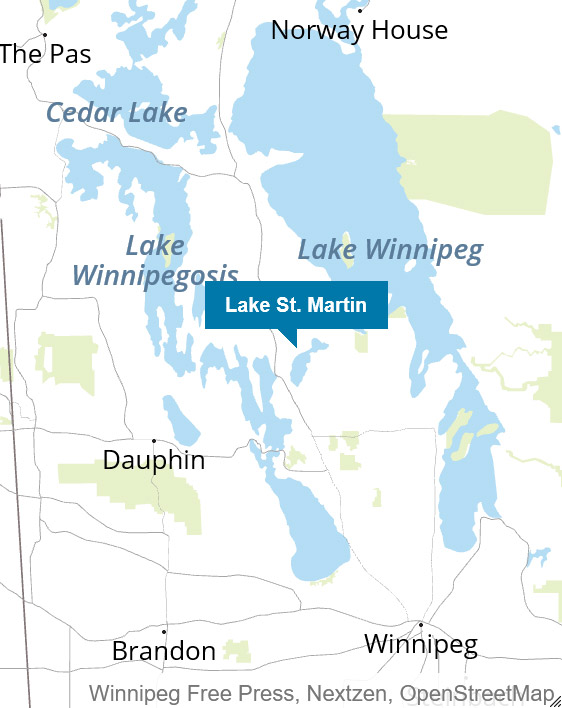
Caron, who is 57, moved to the new reserve, after what felt like a long exile in Winnipeg in 2021. And on a day in June, a Free Press reporter spoke with Caron and her mom in her mom’s modular bungalow, which is not far from hers. Caron’s mom — Evan’s grandma — asked not to be named in this story.
The two women spoke about Evan, who was 33 when he was killed; about his three sons, who are now 13, 16 and 18; and about the years they’ve all had without him.
Caron is raising Evan’s two oldest sons; his youngest lives with his mother, not far away. The boys have each struggled in their own ways since Evan was killed, Caron said, adding, “they really need their dad.”
Caron’s struggles with the inquest process are not new — nor is she alone. A four-month Free Press investigation has found that, for years, inquests into fatal shootings by police have been plagued by lengthy delays in Manitoba. Other families of victims have struggled to access legal counsel. And some families, staring down a machinery that appears stacked against them, have opted not to participate.
When it starts, the inquest into Evan’s death will be a joint one. It will also examine the death of 23-year-old Adrian Lacquette, who, like Evan, was Anishinaabe from Treaty 2 territory. Adrian was fatally shot by two Winnipeg police officers a week and a half before Evan. But the two men were connected in another way: Adrian was the maternal uncle of Evan’s eldest two sons.
The question of why — six years after Evan’s death — the inquest still hasn’t taken place is one that frustrates Caron and her family.
The investigation into his death by the Independent Investigation Unit of Manitoba (IIU) — which examines all “serious incidents” involving police in the province — was quick, taking about six months. The IIU cleared the unnamed officer who shot Evan, saying there was not “reasonable grounds to believe that (the officer) exceeded the ambit of justifiable force.”
The province’s chief medical examiner called for an inquest into his death soon after.
“It would be nice if I had someone to help.”–Vivian Caron
The delay lies, in part, with a provincial court decision.
By spring 2022, the court had elected to stop scheduling inquests until at least the fall of 2023. The plan was to prioritize the criminal cases that had piled up amid COVID-19-related court closures. (There are currently nine other inquests involving fatal shootings by police where the process has begun, but hearings have yet to take place.)
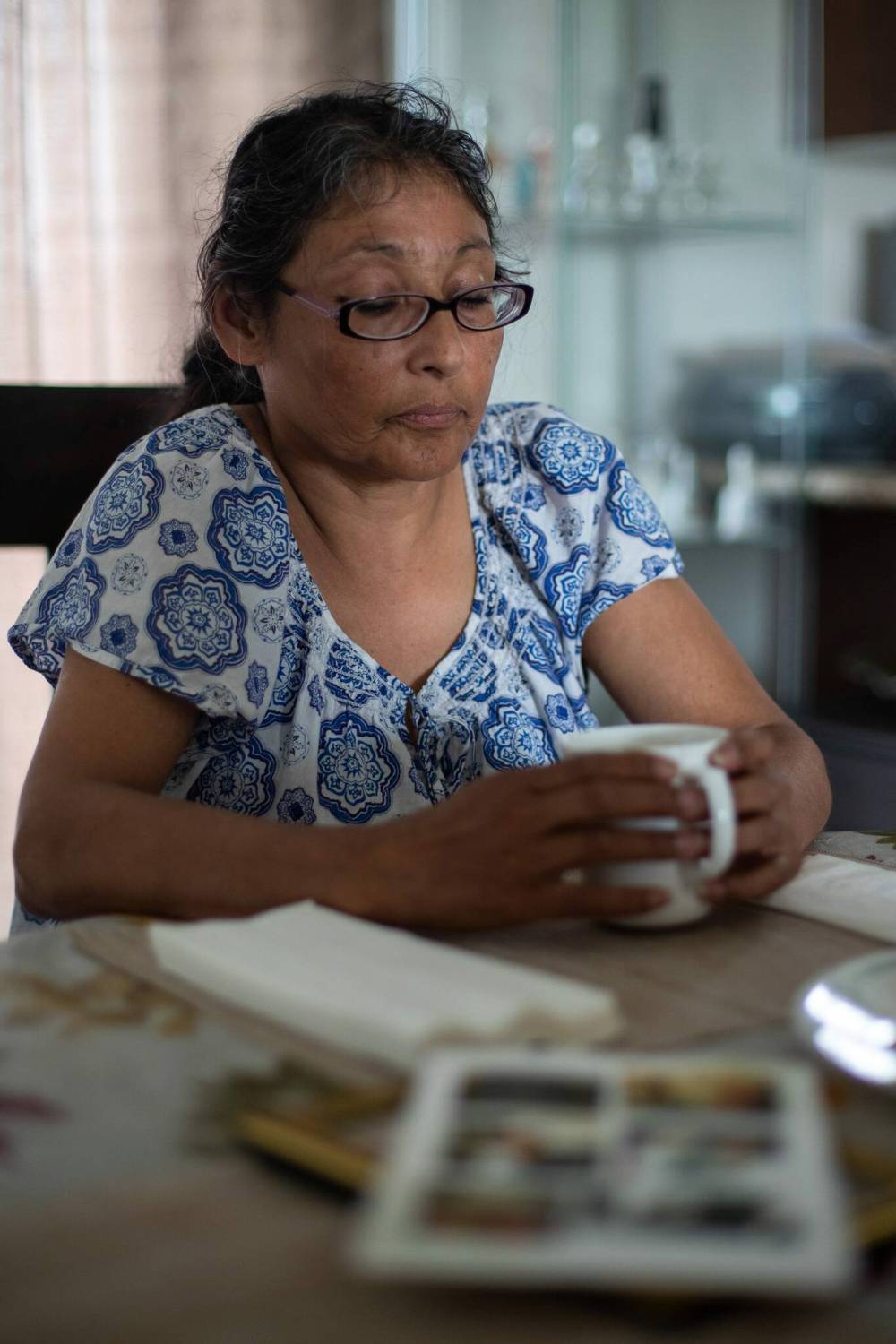
Caron said she was unaware of the scheduling moratorium until told about it by a Free Press reporter.
“It would be nice if I had someone to help, who was involved in this, that could say what you just told me,” she said.
In a July interview, Margaret Wiebe, who spoke with the Free Press during her last week as the provincial court’s Chief Judge, said she could not speak about specific inquests. Asked nonetheless about the delay in Evan’s, Wiebe said it is a more complicated question than simply looking at the amount of time elapsed following a death.
“It’s not necessarily the court that is delaying the progression of the inquest,” she said. “We’ve been dealing with three years of COVID, the impacts of it.”
“Do I have full sympathy for a family who are waiting that period of time? We absolutely do.”
Asked if the court should have informed Caron’s family about the stoppage of inquests, Wiebe noted the information was made public. The only reference the Free Press found was a single paragraph in the court’s 44-page 2021-22 annual report.
In July, a Free Press reporter asked the court about the status of the inquest into Evan and Adrian’s deaths. An official said it has been scheduled for Jan.15-26, 2024.
Those dates were news to Caron, who said she has not been contacted about them.
Last year, Caron said, she was advised by inquest counsel — Brandon-based Crown attorney Rich Lonstrup — that the inquest would be three weeks long. She’s unclear why it’s since shrunk to two.
Request for funding denied
When the inquest begins, the judge will hear that Caron called the Winnipeg police late in the afternoon on Sept. 23, 2017. That Caron reported to police Evan was using methamphetamine and was pacing around carrying knives, paranoid and agitated. That the officer who broke down Caron’s front door and fatally shot Evan described firing after Evan swung a knife at his face.
It’s less likely, however, the judge will hear about the time Evan came home bloodied as a teenager while living in Winnipeg, saying he’d been beaten up by the cops. Or when the province decided to flood their family’s reserve, giving some just a few hours to leave their homes. Or the research that links substance use with experiences of racism and trauma.
Caron wants the court to know that context, but without a lawyer, it’s been difficult.
Initially, Caron did have a lawyer. Caron’s mom helped out with the fees. That lawyer then applied to the provincial government for funding to help cover his costs.
Provincial funding is technically available for families who’ve been granted standing in inquests, as Caron has, but only in “extraordinary cases,” according to a government fact sheet.
The factors the province considers include: the complexity of the inquest; whether it could be said the Crown attorney assigned to the inquest is not able to “protect the family’s interest;” if the family had a role in the events being examined; and their ability to pay.
In a letter to Manitoba Justice, Caron’s then-lawyer, Alex Steigerwald, argued the Crown running the inquest could not represent the family’s interests. For one, he noted, the prosecution service had — “with the help” of the Winnipeg police — prosecuted Evan before.
Steigerwald also pointed out that at the time, in late 2018, Caron was living on disability payments, while supporting three children. Without funding, she’d go without a lawyer.
The request was denied.
In an August 2019 letter, Lavonne Ross, then the director of Manitoba Justice’s Legal Services Branch, wrote that “the interests of justice do not require that Manitoba make a contribution” to Caron’s legal expenses.
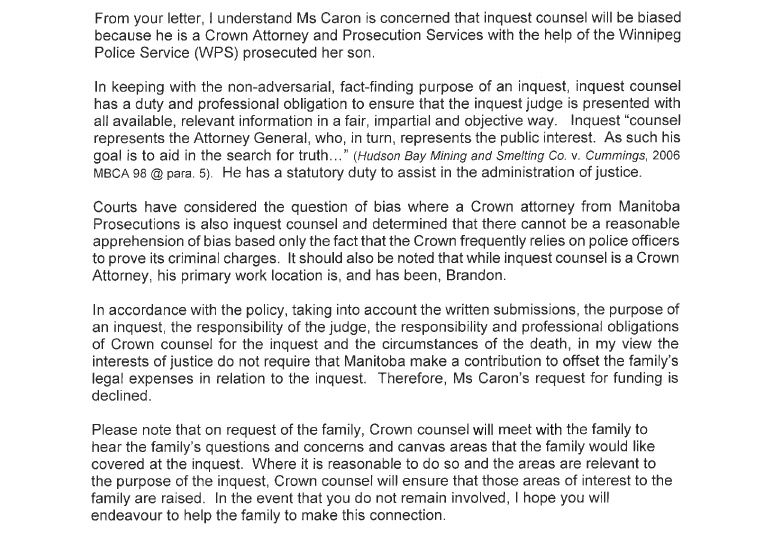
Asked about Caron’s case, Justice Minister Kelvin Goertzen emphasised he did not know any details of it — and that it is not he, nor other politicians, who make those decisions. But speaking generally, he acknowledged that sometimes mistakes are made.
Goertzen added he would be interested in knowing why some cases didn’t meet the province’s criteria.
“Is the criteria too strict? Is it not being applied appropriately? Or is it?” he said.
According to a statement from an unnamed provincial spokesperson, Manitoba Justice has received 10 applications for this funding — to help with legal fees for inquests of any kind, not exclusively related to fatal shootings by police — since 2017. Officials approved five. The spokesperson declined to provide additional details.
Over the last 20 years, 14 inquests have been completed into fatal shootings by police in the province. Yet lawyers represented victims’ families in about half those cases.
One lawyer was funded — partially — by the province, after he successfully appealed an initial rejection. Another lawyer, also after a lengthy appeal, had around 1.5 per cent of his fees covered. Others worked pro bono or were paid by organizations.
Out of funds to pay a lawyer, and feeling it would be pointless anyway, Caron didn’t move forward with an appeal of the denial.
On the second anniversary of Evan’s death, she sued the city. She filed a lawsuit without any legal help. Written in cursive, her statement of claim reads, in full: “My son was gunned down by a City of Winnipeg police officer.” A judicial officer dismissed it, court records show.
“You need somebody there with you that has their head on straight.”–Vivian Caron
Without a lawyer, Caron has had to try her best to be one.
The first time she tried to review the disclosure materials for the inquest, she drove the three hours from Lake St. Martin to the prosecution service’s downtown Winnipeg office. But when she got there, she said, the staff couldn’t unlock the digital materials.
A second trip went more successfully, in that she was able to review the materials, but making sense of them was another question. To her, it was like reviewing something written in code.
After a day spent in a room, she left. The financial cost of making the six-hour round trips weighed on her.
Attending meetings with justice officials also proved challenging. “You can’t really process anything at all. You need somebody there with you that has their head on straight,” she said.
“I’m not the same person that I used to be, like, I’m really emotional now,” Caron said, referring to her PTSD diagnosis, which has brought her under the care of a psychiatrist.
It also made it, for a time, impossible for her to work, which she’d done her entire adult life, as an insurance agent within the federal government, and later, in finance and administration for First Nations. (Caron has since gone back to work.)
“How are you going to make sure that that change actually happens?” Caron asked. “Or else we’re just going through the motions for nothing and re-traumatizing everybody.”
Devastating impact of flood
Later, on the deck behind Caron’s mom’s bungalow, Caron searches through photos on her phone. The breeze is blowing, and the horseflies — or bulldogs, as her mom calls them — are hovering, but not biting. In one photo, taken after the flood, Caron’s sons’ suits hang in a closet cloaked in mould.
“That’s how bad the mould was,” Caron said, flipping to another, showing dark mould spattered across a ceiling. “We lost a lot of material things, but nothing compares to losing my son.”
In May 2011, historic levels on the Assiniboine River, which flows southeast from Saskatchewan, prompted the province to divert excess waters toward Lake Manitoba, then onward to Lake St. Martin in an effort to avoid flooding in Winnipeg, as well as cottage country and agricultural lands.
Roughly 1,400 Lake St. Martin community members were evacuated. For some, it would be roughly a decade before they would be able to return.
Research by Myrle Ballard, a Lake St. Martin community member who is currently the director of Indigenous Science at Environment and Climate Change Canada, along with other University of Manitoba academics, has detailed the devastation that evacuees faced: from being told to leave behind their belongings, which wound up mostly destroyed; to the racism they experienced in the Winnipeg hotels they were sent to live; to the lack of consultation over the water-control structures — built in 1961 and 1970 — that laid the groundwork for the forced flooding.
The Lake St. Martin First Nation was located along the shores of the lake that shares its name until 2011, when rush of floodwaters made the old reserve uninhabitable. New land was found and new homes built years later; the community is now located about seven kilometers away from its former site. The top image is a satellite view of the area in 2011; the bottom shows the old and new communities in 2023.The flood’s impact can’t be overstated. In the six years afterward, at least 92 of the community’s roughly 1,400 on-reserve members died, CBC News reported. Many deaths were attributed to the stress and adversity related to the evacuation.
“This flood just totally ruined my life,” Caron said, pointing out the same was true for many community members.
“It’s so much death — so much death and destruction.”–Vivian Caron
In the first year of their displacement to Winnipeg, Caron’s sister died. Her body gave out from the stress of it all, Caron said.
In 2014, while living as an evacuee in Winnipeg, her niece was murdered. Evan was a pallbearer at her funeral.
Then, in early 2017, Caron’s nephew was murdered, also in Winnipeg. Evan was again a pallbearer.
And then, later that year, came Evan’s death. “I say he was murdered,” Caron added.
“It’s so much death — so much death and destruction,” she said.
Before the evacuation, Evan was working on his carpentry apprenticeship and living in Lake St. Martin with Caron’s mom, his one-year-old son and his then-girlfriend. After the displacement, Evan found himself living in a Winnipeg hotel.
“Evan didn’t deserve to die. He was doing drugs, yeah. And it was meth, yeah. He didn’t hide it,” Caron said.
“He would be honest with me, he’d say, ‘it makes me feel better.’”
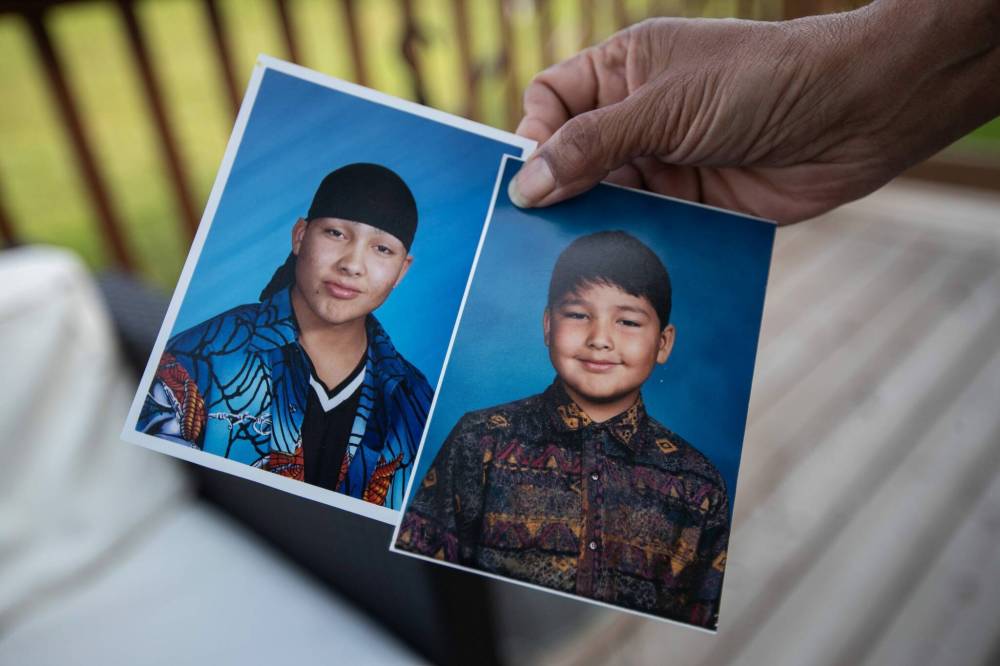
Caron said she saw no evidence of meth in Evan’s life until after the evacuation.
Caron and her mom agree, the drug changed him. The Evan they remember manned the barbecue at family functions, piled food high on his sons’ plates, and hugged them tight, even when they were getting big.
And his laugh — a big loud laugh. That sticks out.
He was the kid who watched out for his brothers, brought flowers to girls at school — and when he had grown up, to his mom. Who was close with his grandmother, making bannock like she taught him, even ferrying her cat to Winnipeg during the evacuation. Who was always joking around, laughing.
Night of killing: high, armed, paranoid
Evan had plenty of run-ins with the Winnipeg police before he was killed. He had a record. He had spent some time in jail. His family doesn’t mince words about it.
Sometimes, Winnipeg police officers would find Evan walking around the city high, and they’d pick him up and bring him to Caron or her mom’s house.
It was a good thing they’d do, Caron said, and it helped keep Evan out of harm’s way.
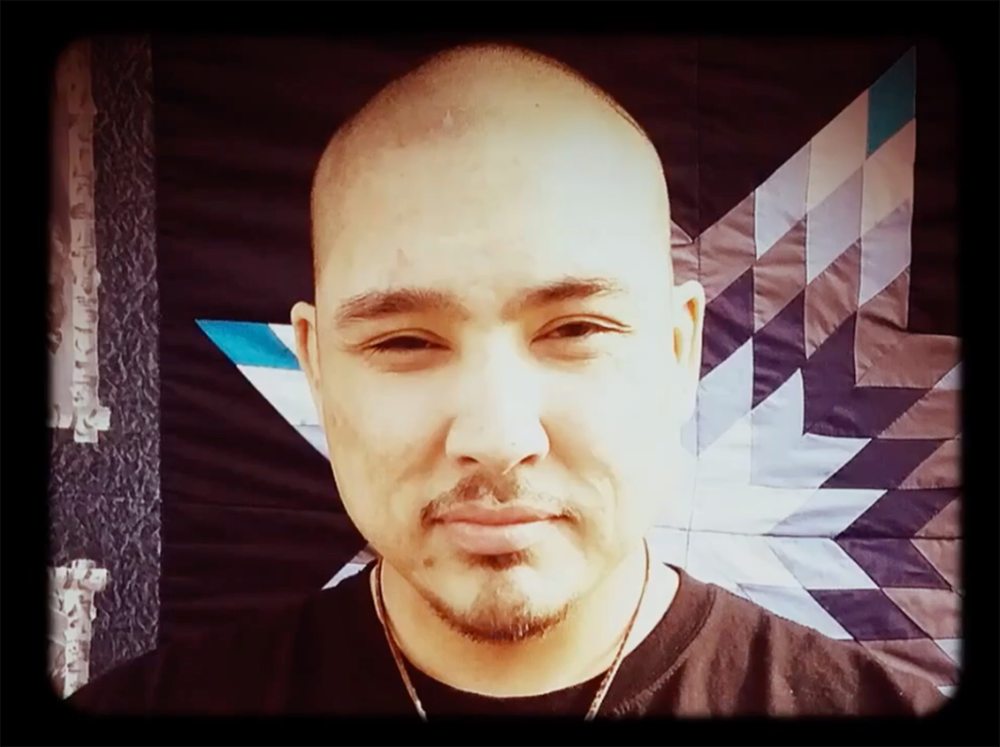
That approach was on display on Sept. 11, 2017. Evan was in Caron’s basement, high, paranoid and holding knives.
Police were called. Two officers — a man and a woman — arrived. Caron said the woman approached the situation calmly and carefully. She asked Evan to drop the knives and he did.
The officers took Evan to Seven Oaks General Hospital. Hours later, he was released.
Around that time, Evan, with Caron’s help, then tried to get into a drug treatment program, but he was stymied by health-care bureaucracy.
Less than two weeks later, an incident began similarly but ended with a starkly different outcome.
Evan was again at Caron’s house, high and holding knives. He believed the police were after him. When one of Evan’s younger brothers tried to calm him down, Evan punched him. Caron called 911.
“I tried running out to tell them not to shoot and that’s when they shot him.”–Vivian Caron
Caron remembers looking out a window and seeing police officers “creeping” towards her front door, near where Evan was. She ran out a side door.
“I tried running out to tell them not to shoot and that’s when they shot him,” she said.
The officer who shot Evan later told the IIU in an interview that he heard screaming behind the front door, and believing someone’s life was in danger, he kicked it down. When he broke through, he said he saw Evan lunge toward him with a knife, and fired.
The officer hit Evan with five rounds. Two more missed Evan and flew through a wall, according to the IIU’s report, narrowly missing Caron’s younger son, who was hiding in a bedroom.
It was only after the officer fired his gun, he told investigators, that he became aware Evan had stabbed his upper arm, the knife blade embedding there. The officer underwent surgery to remove it at the Health Sciences Centre, the IIU’s report says.
Neither Caron, nor any of her family members witnessed the shooting. There’s no surveillance camera, cellphone, dash-cam or body-cam footage of it. There were no civilian eyewitnesses.
It means Caron has only the officers’ accounts. And as the years pass without answers, she’s harboured doubts the events transpired as the officers have said.
Witnesses, family members ‘not seen as victims’
After Evan was shot, Caron, her then-partner, and Evan’s kids were ushered to waiting cruisers, as their neighbours looked on. Caron was wearing her housecoat and wanted to change, but she recalled the officers saying she couldn’t, nor take a change of clothes.
“The first thing they did was take away all our cellphones. And then they put us in police cars like we were the guilty ones,” she said.
They were put in a cramped interview room at the police station. Officers brought the family pizza. At one point Caron went outside for a smoke. Standing in her housecoat, she sensed officers laughing at her.
Caron remembered being held at the police station until after midnight — about eight hours after Evan was shot.
“I was already having panic attacks and hyperventilating,” she said.
Four months earlier, the judge leading the inquest into the death of Craig McDougall, a 26-year-old man from Wasagamack First Nation who’d been shot by a Winnipeg police officer in 2008, issued several recommendations related to the treatment of his family members.
Judge Anne Krahn — after hearing that McDougall’s father and uncle had been taken to the ground and left in handcuffs until they were placed in locked rooms at the police station — recommended the service be more careful to tell witnesses that they are free to go, if they wish, and have no obligation to provide a statement.
She also said witnesses who observe a traumatic event should be connected with a victim-services worker or given information on how to get support.
Caron told the Free Press neither of those recommendations seemed to impact the actions taken in her case. She said victim support should be mandatory, but added: “I guess we’re not seen as victims.”
The Winnipeg police declined to answer the Free Press’s questions about Evan’s death and his family’s treatment afterward because the inquest is ongoing.
What troubles Caron and her family, among other questions, is the view that the officers who came to her house that September afternoon made no efforts to de-escalate the situation. To slow things down and reason with Evan, instead of kicking the door in.
“Why don’t you try and talk through the situation?” Caron asked. “They didn’t try to say, like, ‘Hi Evan, how are you doing? What’s the problem? What’s the situation?’”
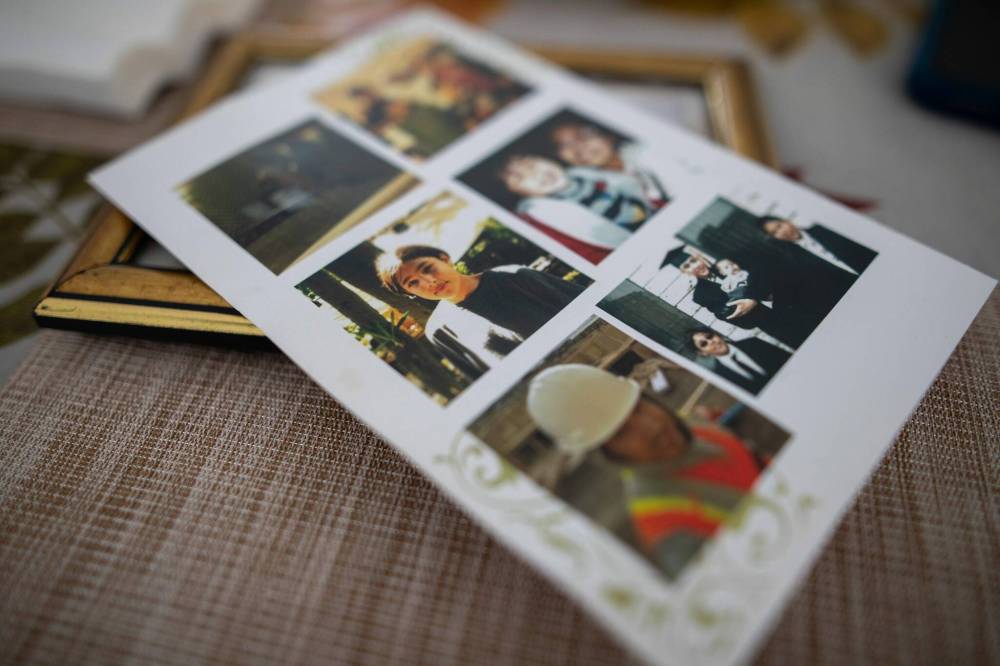
Caron also believes police are left responsible for too much. That a mental-health intervention is beyond what they’re trained to do.
While Caron talked, her mom was mostly quiet, puttering nearby in her wheelchair, and calling out every so often, “You OK, Viv?”
But at one point, she interjected. Something else needed to be said.
After Evan’s body was taken away, the entrance of Caron’s house was covered in his blood, the older woman recalled.
“Why didn’t they get somebody to clean that blood up?” she asked.
“They left a bunch of blood there for somebody else to clean it — for the family to clean it. After what they did…” she stopped.
“They should have known better to clean it up. But they didn’t. They didn’t give a shit.”
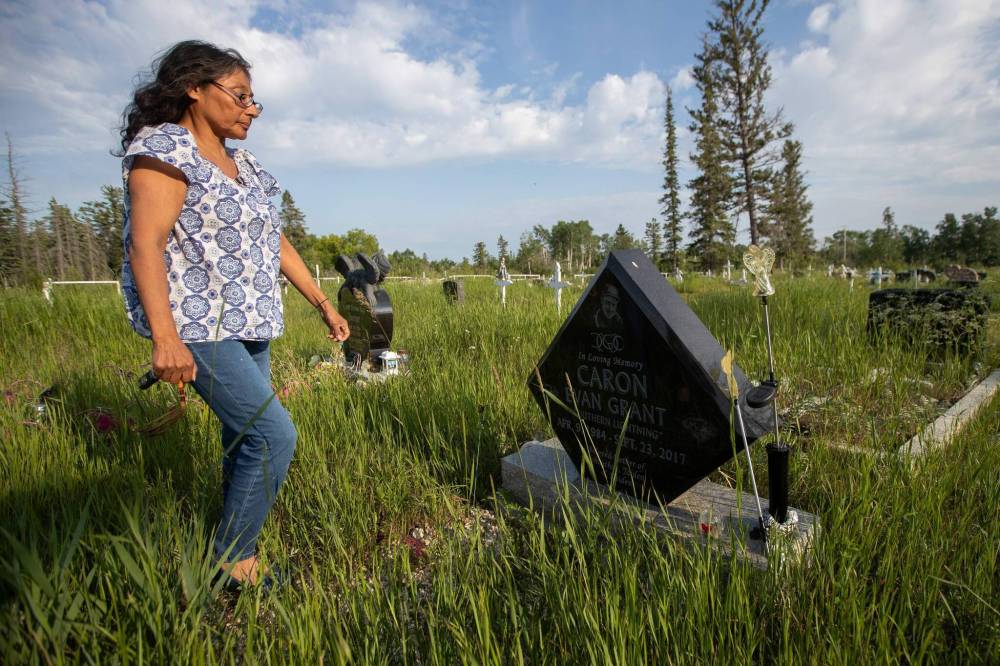
At the cemetery in Fairford, where Evan is buried, the sun is inching lower in the sky. It’s about a 25-minute drive from the new reserve. There’s a mix of headstones and white crosses, and the Fairford River, which links Lake Manitoba to Lake St. Martin, flows along one edge.
Along with his legal name, Evan’s headstone is inscribed with the name given to him by an Elder — Southern Lightning; each of his sons’ names; and the name of the music production venture he’d started up in Winnipeg, NDGO.
He’s buried near a brother on his dad’s side, who died of cancer, as well as his baby niece, Evanee, who was named after him.
“I think he would have had a good life,” Caron said softly, before climbing back into her car.
In a few minutes, she will drive back across the Fairford River, over the dam that released a powerful rush of water and destroyed the good life she’d once had.
The Free Press is interested in hearing about your experiences with the inquest system. If you have something you’d like to share, please contact us at: marsha.mcleod@freepress.mb.ca

Marsha McLeod
Investigative reporter
Signal
Marsha is an investigative reporter. She joined the Free Press in 2023.
Our newsroom depends on a growing audience of readers to power our journalism. If you are not a paid reader, please consider becoming a subscriber.
Our newsroom depends on its audience of readers to power our journalism. Thank you for your support.





